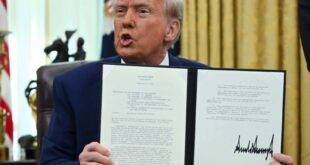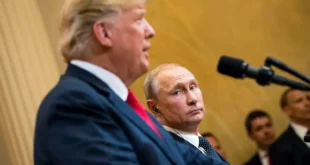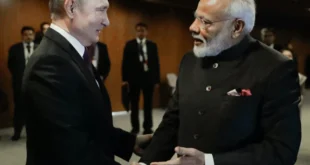While the world is following the dramatic unfolding of the Russian aggression against Ukraine’s sovereignty and territorial integrity, Europe needs to start elaborating its vision for the post-war world. While a new Yalta might be needed, we all should realise that a peaceful world order has never existed outside the European Union. This in itself grants the EU the credibility – and responsibility – for arranging the post-war framework that secures the peaceful future of the continent.
By Dr.Maria Alesina and Francesco Cappelletti*
In the interconnected international society, war is not only a horrific and painful but also irrational choice. It is a zero-sum game, which sets into motion the domino effect of global repercussions. However, rational considerations have little to do with what stands behind the ongoing military attack on Ukraine. Russia’s war is not limited to Ukraine or aimed at a regime change to strengthen regional influence (as realists would say), nor does it represent an attempt to reinforce specific strategic interests (as a cognitivist analysis would suggest). It has emerged as something beyond traditional disputes: it is, as a matter of fact, an ideological war against the West. More than anything, it is Huntington’s “clash of civilizations”, although driven not by ideology or religion but by the two conflicting standpoints on human life – as a value and a non-value. This fundamental clash is happening now on the Ukrainian soil, and the battle is as fierce as it can possibly get.
The propaganda-driven “Rus-zism” rhetoric, missing any solid ideological basis or constructive meaning, consists of an overt anti-Western narrative aiming to establish a multi-polar world order and a vaguely defined concept of Russia’s “greatness”, entrenched in the shreds of evidence given by altered revision of events, such as the Great Patriotic War. A war that, in the eyes of the Russian establishment, has never ended. In the anti-Western rhetoric, the corroborating factor is a series of facts, events, convictions, beliefs, interests that support the leitmotif of the inevitability of “blocks”, an enemy, the “others”. A heritage of the Cold War. All this is grounded in the historical super Troika of the Russia’s foreign policy: fear of external threats, dispersed economic and political inefficiency, and focus on securing citizens’ support – by all means, ranging from propaganda to political repressions. This is a sheer exercise in power without purpose, control without vision, projected both internally and externally. This dynamic, although never fully dissipated, has been re-gaining momentum starting with Putin’s speech at the 2007 Munich Security Conference.
Today, in mid-2022, Russian aggression in Ukraine is only growing in atrocities and cynicism. In contrast, the EU politics still remain a palliative medicine, by definition unprepared to dealing with the concept of war. Political crises in several Member States – Italy, France, Estonia, Bulgaria – risk becoming a further destabilizing factor preventing the EU from fully standing up against Putin’s war plans. Meanwhile, the Europeans are becoming increasingly concerned with the upcoming ‘Russian winter’, recession, global food shortages, and a new migration crisis. As much as citizens advocated for support to Ukraine in the beginning, soon they might start demanding peace at any cost – most likely, Ukraine’s cost. This is the trap that Russia is orchestrating.
However, any simple, although desperately needed, ceasefire agreement risks only deepening the problem and postponing the solution. It will be a matter or years, if not months, when Russia restarts its aggression, possibly better prepared the next time around. The somewhat belated understanding of this simple truth should prevent us from re-engaging into the dilemma of prioritizing short-lived comfort and material gain over long-term solutions based on our fundamental, “civilizational” priorities. We need to remember that Europe’s prosperity has resulted from a prolonged period of peace – not vice versa. Those who threaten the peace, by definition threaten our growth and sustainability. Alongside building up its strategic autonomy for the 21st century, Europe must be prepared to do what it takes to secure a new long-term peaceful world order – not simply patch the old one.
…
Given that the ‘Russian factor’ will not disappear even after the overt military conflict is over, the Cold War II stands in the midst of diplomatic challenges anticipated for the post-war scenario. On the one hand, as Russia has acquired the official status of the world’s villain, dethroning China from this role, it will continue to face some extent of isolation. Regaining any level of trust will require years, and Moscow will struggle to find a credible audience to speak to when trying to redefine its external relations, while having to deal with a prolonged recession and a technological slowdown never experienced since 1991. On the other hand, without being naïve, we cannot expect any substantial regime changes to happen in Moscow. For centuries, the narrative ‘Russia vs. the West’ has constituted the very central axis of the national public discourse, even within the liberally-minded opposition circles. Such long-standing trends do not change quickly, if ever.
Although no notions of trustworthy diplomacy will bring Russia to the international negotiation tables for a long time, the need to guarantee security goes beyond this conflict and its territorial or ideological implications. The only viable solution is to find a way to contain Russia within a binding and comprehensive international framework. This means a pragmatic approach is needed in developing untouchable geopolitical, diplomatic, and security-related boundaries of the new order. The exact same boundaries that kept the first Cold War “cold”, with the difference that this time one of the great powers involved is – to use Kennedy’s word – declining.
The results of the potential Kyiv-Moscow talks will largely depend on the West’s willingness to avoid grey zones in the future security settlements. It is a matter of responsibility, especially for the EU, to provide a forum to assess, judge, clarify, evaluate, measure, and pragmatically set limits of the new post-war security system. While the US is interested, first and foremost, in slowly weakening Russia politically and economically, Europe’s long-term concern consists primarily in preventing its giant neighbour from disrupting the very basic principles of coexistence on the continent. A zero-trust model should be applied to Russia, while a new paradigm for debates should be developed from scratch: there is no more “balance of power” and “deterrence” to fit into the discourse. The world is now divided into nations that either care or not about commonly accepted principles, rights, and, above all, about the value of human life. The end of history, in 2022, is farther away than expected.
*Dr Maria Alesina and Francesco Cappelletti are Policy and Research Officers at the European Liberal Forum. Dr Alesina holds MA degrees in Political Science and EU Studies obtained in Ukraine, Germany and Belgium and a PhD degree in interdisciplinary cultural studies from Ghent University. She specializes in EU foreign, social, and cultural affairs. Francesco Cappelletti holds an MA in International Relations from the University of Florence and MA in World Politics from MGIMO. Member of Center for Cybersecurity in Florence. He focuses on cybersecurity, digitisation, Russian-Western relations and the relation between sustainability and technologies.
 Geostrategic Media Political Commentary, Analysis, Security, Defense
Geostrategic Media Political Commentary, Analysis, Security, Defense





